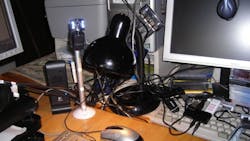Telecommuting and the Changing Workplace
I was a little surprised by the results of last month's poll where we asked readers about their practices and preferences regarding working from a home office. About a third of the respondents said they work most of the time from a home office. About a third prefers the company office. About a quarter would like to work more from home but aren't allowed to. In addition to these results, about a third reported that they were more productive in the company office; a third said they were more productive at home and the remainder said it didn't matter. Now, granted that not all readers work at a utility – a good number come from vendors and consulting firms. Nonetheless, the poll reflects a changing workplace culture in the power industry.
Not all that long ago the utility industry was in a more 'stable' state. Oh sure, deregulation was progressing and that was causing some upheavals in the top floor offices. But in the engineering and operation departments it was pretty much business as usual, punctuated by occasional large outages and major new construction. In that environment it's so much easier to measure a workers performance by just keeping track of their attendance rather than their output and accomplishments. Process often got more attention than it deserved at the cost of progress. For many, their company being in a stable state meant they were kept in a stable.
Some of us "elder statesmen" remember those days. When I took my first job in a utility I wasn't provided health insurance for the first six months. I remember new engineers coming in sick because they couldn't afford to take days off without pay. The flu season was a fiasco with all the cross-infections. But by golly, our fevered, virus-infected bodies were parked in our cubicles and our attendance was duly noted on the weekly timesheets so our supervisor was satisfied. The mission was being accomplished with hardly any output.
Benefits have changed, of course. But more significantly, job emphasis is much more on production and accomplishment rather than just bodily presence. It has to be; otherwise the industry will drown in the tide of change. The paradigm of power delivery is being reformed and the new breed of bright, well-trained engineers and other technologists is being expected to overcome major challenges. And they have the enthusiasm to keep at it without micromanagement. You don't have to accurately monitor attendance and work hours – just get the right people in the right positions, give them adequate support – both in and out of their cubicles – and reward them for accomplishments. Other high-tech industries have found that this can work and even increase productivity.
